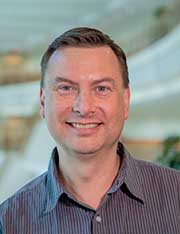Dr. Jay R. Dittmann
Professor of Physics

Education
- Ph.D. - Physics, Duke University - 1998
- M.A. - Physics, Duke University - 1995
- B.S. - Physics, Valparaiso University - 1992
- B.S. - Mathematics, Valparaiso University - 1992
Biography
Dr. Jay R. Dittmann was an undergraduate at Valparaiso University in Valparaiso, Indiana, where he graduated summa cum laude in 1992 with a Bachelor of Science in Physics (with honors) and a second Bachelor of Science in Mathematics. He earned his Ph.D. in Physics from Duke University in 1998, and for several years was a Leon M. Lederman Fellow at the Fermi National Accelerator Laboratory (Fermilab) in Batavia, Illinois. Dr. Dittmann joined the faculty at Baylor University in 2003, where he continues to perform research in experimental high energy physics.
As an undergraduate, Dr. Dittmann gained research experience by participating for two summers in the Research Experience for Undergraduates (REU) program at Michigan State University, where he worked at the National Superconducting Cyclotron Laboratory. He also performed research with the MEGA Collaboration at the Los Alamos Meson Physics Facility in New Mexico.
Dr. Dittmann's love for experimental physics grew out of a childhood passion for tinkering with buttons, switches, and other devices. He enjoys puzzles and games, music, computers, and basketball. He lives in Hewitt, TX, with his wife Jeanne, a professional calligrapher and Baylor librarian.
Research Interests
Dr. Dittmann is engaged in experimental elementary particle physics, the science of the fundamental nature of matter and energy. As a member of the Compact Muon Solenoid (CMS) collaboration, he investigates the properties of particles produced in proton-proton collisions at the Large Hadron Collider at CERN in Geneva, Switzerland. He was involved in the search for and discovery of the infamous Higgs boson, one of the most exciting discoveries of particle physics. In addition, Dr. Dittmann is interested in studies of the top quark and Higgs boson, Quantum Chromodymanics (QCD) and searches for Supersymmetry and other new phenomena.
Relevant links:
Compact Muon Solenoid (CMS) Collaboration
The Large Hadron Collider (LHC) at CERN
Fermi National Accelerator Laboratory (Fermilab)
Courses Taught
PHY 1420 - General Physics I
PHY 1420 Honors - Honors General Physics I
PHY 1430 - General Physics II
PHY 1430 Honors - Honors General Physics II
PHY 1V95 - Special Research Problems in Physics
PHY 2360 - Mathematical and Computational Physics
PHY 3320 - Intermediate Classical Mechanics
PHY 3V95 - Undergraduate Research in Physics
PHY 4001 - Exit Exam
PHY 4196 - Senior Physics Research II
PHY 4360 - Computer Models in Physics
PHY 4373 - Introductory Nuclear and Particle Physics
PHY 4V9R - Research
PHY 5180 - Graduate Physics Colloquium
PHY 5V95 - Graduate Research
PHY 6V99 - Dissertation
HON 3100 - Honors Advanced Readings & Research
HON 3101 - Honors Advanced Readings & Research
HON 4V87 - Honors Thesis
Ph.D. Graduate Students
Karen Bland (Ph.D. 2012)
Martin Frank (Ph.D. 2011)
Samantha (Sam) Hewamanage (Ph.D. 2011)
Christopher Madrid (Ph.D. 2020)
Caleb Smith (Ph.D. 2020)
Zhenbin (Ben) Wu (Ph.D. 2012)
Grants Funded
U.S. Department of Energy: Elementary Particle Physics at Baylor (2005–present)
Recent Publications
Please visit INSPIRE for links to Dr. Jay Dittmann's most recent publications.